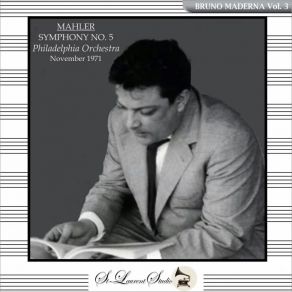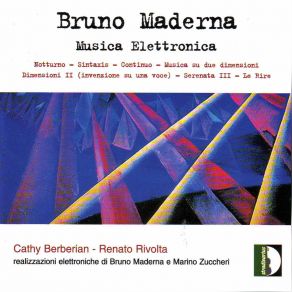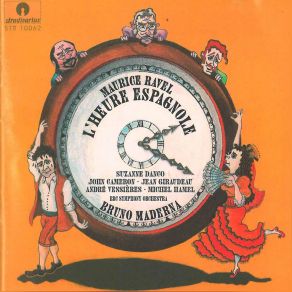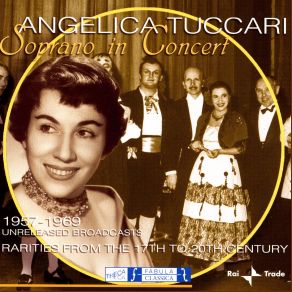Bruno Maderna
Wikimp3 information about the music of Bruno Maderna. On our website we have 21 albums and 5 collections of artist Bruno Maderna. You can find useful information and download songs of this artist.
Biography
[Edit]Bruno Maderna was one of the leading composers and conductors on the post-War avant-garde music scene.
He was an authentic child prodigy who started to study music at the age of four. At seven, under the patronage of the Princess Edmond de Polignac he performed as a conductor and violinist under the name "Brunetto."
He studied at the Verdi Conservatory in Milan and in the Rome Conservatory. In the latter he studied composition with Bustini. He obtained his diploma in 1940, then when to the Venice Conservatory where he studied with Malipiero. In 1941 he studied conducting at the Accademia Chigiana in Siena.
He was called to military service in the Italian Army, but joined the partisans against the Fascists. Relief of Italy from Mussolini's Fascist government, in common with other parts of Europe, lifted a ban on twelve-tone music, which in Europe thereby achieved an identification with anti-Fascist and other progressive tendencies. The German city of Darmstadt became a center of studies and performance into this new composition technique, particularly in the totally serialized form evolving from the music of Anton Webern (1883-1945). Maderna went to Darmstadt, where he studied conducting with Hermann Scherchen, who also influenced Maderna's choice, as a composer, to use the twelve-tone system.
As a composer he began with the premise that dodecaphony (12-tone music) was a common international musical language that would become common to composers. After about 1957 it became clear that various different styles, varying from nation to nation, would develop. He then absorbed both neo-classical and German expressionist influences as well as adopting some aleatoric (chance) procedures. His Oboe Concerto no 1, Le rire, Musica su due dimensioni, Juilliard Serenade, and Quadrivium are some of his leading compositions, often with strong dramatic values, although the twelve-tone procedures make the music problematical for many listeners.
In 1954, he and Luciano Berio founded the Studio di Fonologia in Milan, a leading electronic music studio, and frequently taught in Darmstadt and Milan. He was permanent conductor of the Darmstadt International Chamber Ensemble, taught at the Rotterdam Conservatory from 1967 to his death, was chief conductor of the Radio Milan Symphony Orchestra (from 1971) and director of the Berkshire Music Center in Tanglewood, Massachusetts (1971-1972).
While his conducting career was almost always associated with the avant-garde, he was, by the time of his untimely death from cancer, expanding the stylistic range of his conducting repertory.
Title: La morte ha fatto l'uovo (Colonna sonora originale del film)
Artist: Bruno Maderna
Genre: Theatre/Soundtrack, Classical
Title: Acousmatrix - The History of Electronic Music VII
Artist: Luciano Berio, Bruno Maderna
Genre: Electronica
Title: Mahler: Symphonie Nr. 5 / November 1971
Artist: Philadelphia Orchestra, The, Bruno Maderna
Genre: Orchestral, Classical, Orchestral
Title: Gustav Mahler - Symphonie Nr. 9
Artist: BBC Symphony Orchestra, Bruno Maderna
Genre: Classical
Title: Fifty Years International Gaudeamus Music Week
Artist: David Zinman, Netherlands Radio Choir, Bruno Maderna, Netherlands Chamber Orchestra, Hague Philharmonic, Ives Ensemble, Netherlands Radio Chamber Orchestra, Arturo Tamayo, Lucas Vis, Richard Rijnvos, Rijnmond Quintet, Amsterdam String Quartet, Radio Wind Ensemble, Orquesta Sinfónica De RTV Española / Orquesta Sinfonica De RTV Espanola, Roelof Krol
Genre: Classical
Title: Maderna: Electronic Music
Artist: Cathy Berberian, Bruno Maderna, Renato Rivolta
Genre: Electronica, Classical
Collections
Title: Darmstadt Aural Documents, Box 1 - Composers-Conductors
Genre:
Title: Klangstudie And Komposition
Genre: Electronica, Alternative
Title: Angelica Tuccari: Soprano In Concert
Genre:
Title: The New Music, Vol. II
Genre:
Title: Maderna: Orchestral Works (Remastered)
Genre:
Featuring albums
Title: Il Mito dell'Opera - Virginia Zeani (Live Recordings 1957-1969)
Artist: Virginia Zeani
Genre:

































